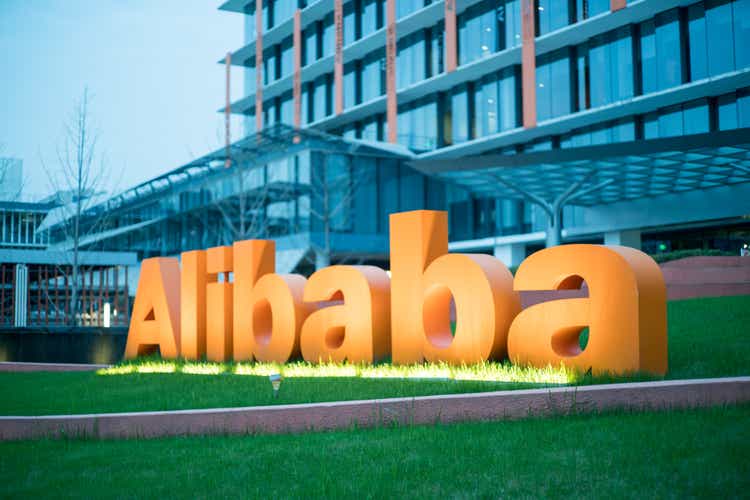maybefalse/iStock Unreleased via Getty Images
Almost a year ago, I wrote a bullish on Alibaba (NYSE:BABA) – Alibaba: The Market Is Being Silly With This Stock – using a DCF analysis to justify that the stock was severely undervalued under the impact of the Chinese government crackdown. Fast forward to today, the stock is down more than 50% and bargain hunters (myself included) have not been rewarded by being greedy when others were being fearful. Let’s review what went wrong.
My initial thesis on Alibaba was very simple: a dominant, highly profitable and cash generative company going through temporary setbacks. Beijing had beef with Jack Ma, but I believe it would not go as far as tearing down some of China’s most powerful tech companies (Alibaba, Tencent, Meituan, etc.). After all, these giants have served as the backbone of the country’s economic growth in the past one to two decade.
Unfortunately, things became progressively worse following Alibaba’s $2.8 billion antitrust fine in April 2021. In July, the Chinese government asked the $100 billion education tech sector to go non-profit, banning companies in the space from making money and going public. Shares of New Oriental Education (EDU) fell 54% in one day and have only gone lower since.
In the same month, the SMAR (State Administration for Market Regulation) ordered Tencent (OTCPK:TCEHY) to give up exclusive music streaming rights within 30 days and slapped the Internet giant with a 500,000 yuan fine ($77,295). Expressing disapproval of tech firms listing shares in foreign countries, Chinese regulators also banned DiDi (DIDI) from app stores following the ride-hailing company’s $4.4 billion IPO in the US.
In August, regulators imposed a rule that would limit kids’ gaming time to just 3 hours a week. Companies such as Tencent and NetEase (NTES) can only provide gaming services to under-18s from 8pm to 9pm on Friday, weekends and public holidays. Although minors accounted for less than 3% of gross gaming revenue in China, investor sentiment quickly soured when Beijing referred to games as “Spiritual Opium”.
At the 10th meeting of the Central Committee for Financial and Economic Affairs, Chinese President Xi Jinping introduced the idea of common prosperity to reduce income inequality, promote investment in underdeveloped regions, and focus on people-centered growth by encouraging high-income individuals and corporations to give back to society.
In September, Alibaba announced that it would invest $100 billion RMB ($15.5 billion) to support Xi’s vision, alongside Tencent ($100 billion RMB) and Pin Duo Duo ($10 billion RMB). “We are eager to do our part to support the realization of common prosperity through high-quality development,” said Alibaba CEO Daniel Zheng.
On November 18, Alibaba reported revenue that missed Street estimates and revised FY22 revenue to grow at 20% to 23% vs. 28% consensus. Shares dropped 11% post-earnings. On the call, management reiterated the $100 billion RMB commitment to things like “advanced scientific and technological innovation” and “high-quality employment”. A week later, Reuters reported that US private equity firm Warburg Pincus, a major investor in Ant Group, had cut Ant’s valuation to $191 billion from $315 billion a year ago before the IPO. On December 3, shares of Alibaba and other tech names hit a new 52-week low on DiDi’s announcement to delist in the US.
However dire the situation may be, investors would always find a reason to be hopeful. Per Citi analyst Alicia Yap, the selloff amongst China tech was overdone and hence a buying opportunity. “We believe DiDi’s situation is likely an isolated incident, and therefore we would view the sell-off as buying opportunity for those big cap ADS that already have dual-listings in HK.”
In January 2022, legendary investor Charlie Munger boosted his stake in Alibaba by purchasing 300,000 more shares. In February, shares of Meituan (HKEX: 3690) and Alibaba (owner of Ele.me) again experienced selling pressure as Beijing demanded food delivery platforms to cut commission fees. The new rule would result in a ~14% drop in revenue for Meituan. Later in the month, Alibaba reported the slowest revenue growth rate for fiscal 3Q22.
In March, a string of bad news remained on the menu for investors. For starters, the Ant IPO would be postponed indefinitely. The SEC named 5 Chinese companies that could be delisted from US exchanges if they do not allow US regulators to review their audits for 3 years. Lastly, it was reported that Alibaba, Tencent and DiDi were planning on cutting 10% to 15% of workforce. Although shares of Alibaba surged 37% on news that Beijing wanted to stabilize markets and promote economic growth on March 16, investors remained cautious despite the company announcing a step up in the buyback program from $15 billion to $25 billion.
So far in April, Citi just reiterated its buy rating on Alibaba, but cut the target price from $200 to $177. On April 11, Charlie Munger cut his Alibaba stake in half from 600,000 shares. To date, Alibaba shares have fallen almost 70% from the $317 all-time-high back in October 2020.
Looking back, it’s clear that I missed the elephant in the room: China is a vastly different investment environment characterized by highly unpredictable government intervention in the private sector. No matter what numbers analysts come up with in their models, the regulatory outlook for Alibaba and other Chinese tech names remain the same: Party first, business second. For this reason, I’d expect shares to remain challenged in the absence of any clear catalyst that may point to a structurally better future. As a result, investors should evaluate whether it’s worth the wait as US tech has taken quite a beating under a more aggressive Fed.


Be the first to comment